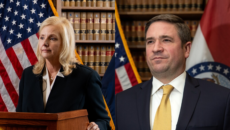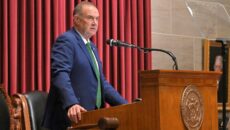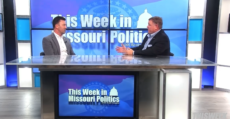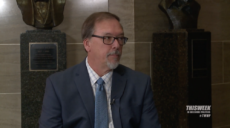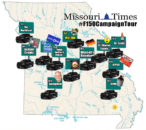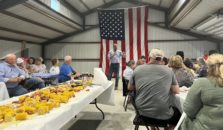Key Points
- Federal crackdown underway: Congress is moving to close the 2018 Farm Bill loophole that allowed intoxicating hemp-derived products like Delta-8 THC to flood the market.
- Senate advances major reform:A Senate-approved measure would redefine hemp to include all psychoactive cannabinoids and ban synthetic THC compounds, with the bill now heading to the U.S. House for consideration.
- Missouri hit hard by loophole: Unregulated Delta-8 products have led to hospitalizations, health advisories, and growing concern from parents, schools, and law enforcement.
- Missouri leaders who led the charge:Attorney General Catherine Hanaway, former AG Andrew Bailey, former Gov. Mike Parson, and State Senators Nick Schroer and David Gregory have all played key roles in confronting the issue and calling for statewide regulation.
The federal government is moving to close a major loophole that has allowed intoxicating hemp-derived THC products to flourish nationwide, a change that could upend an industry worth tens of billions and force states like Missouri to confront the consequences of years of inaction.
A Federal Push to Redefine Hemp
After months of political wrangling, the Senate approved a spending package to end the government shutdown that includes a sweeping redefinition of hemp. The new proposed federal language, supported by President Donald Trump, would effectively ban hemp-derived intoxicants such as Delta-8 and THCA flower, compounds that have proliferated in gas stations and online marketplaces since the 2018 Farm Bill first legalized hemp cultivation.
The Senate-approved measure, backed by major alcohol and cannabis lobbying groups, limits hemp products to those with no more than 0.3% total tetrahydrocannabinols (including THCA) on a dry-weight basis and bars synthetic cannabinoids that cannot be naturally produced by the cannabis plant. The change would eliminate the so-called Farm Bill loophole that blurred the line between hemp and marijuana, ushering in a new era of enforcement.
Hemp advocates call it a “prohibition” that could wipe out as much as 95% of the $28 billion U.S. hemp market, while supporters, including the regulated cannabis industry, say it will finally bring clarity and accountability to a largely unregulated gray market.
In response to last night’s vote in the Senate, ATACH, the American Trade Association for Cannabis and Hemp, released this statement:
“We thank the Senate for demonstrating its resolve to address the dangerous proliferation of unregulated synthetic THC products. What began as a small loophole has become a public-health crisis. Clarifying congressional intent in the 2018 Farm Bill is essential to protecting consumers and giving legitimate hemp farmers the regulatory certainty they deserve.”
Also chiming in was the senior Senator from Kentucky, a state which houses much of the Hemp industry, Senator McConnell, who said the measure “preserves the legitimate hemp industry while addressing the rise of intoxicating and synthetic THC products.”
The Loophole’s Fallout in Missouri
Few states illustrate the Farm Bill’s unintended consequences more clearly than Missouri. Since the federal legalization of hemp, the state has been inundated with unregulated THC-infused gummies, drinks, and vapes, many containing Delta-8, a psychoactive cannabinoid synthesized from hemp-derived CBD.
Marketed in colorful, candy-like packaging, these products have been easily accessible to teenagers and even children. In 2024 alone, two separate incidents in St. Louis sent more than a dozen students to hospitals after they consumed Delta-8 edibles purchased at local convenience stores. Poison control centers across the country reported an 82% spike in Delta-8-related calls between 2021 and 2022, prompting federal and state health warnings.


The Missouri Department of Health and Senior Services issued its own health advisory last year, cautioning that these products are untested, often mislabeled, and pose a risk to public safety. The agency urged Missourians to purchase only from licensed dispensaries.
Key Figures Driving Missouri’s Response
Now with the closing of the loophole heading to the House of Reps, its important to recognize several of Missouri’s leaders who spent the last few years working to tackle the issue of these unregulated products.
- Attorney General Catherine Hanaway, who succeeded Bailey, has continued to support stronger enforcement measures and has emphasized that protecting children from unregulated intoxicants remains a top priority for her office. Hanaway has signaled she will continue pursuing cases against companies that mislabel or illegally distribute hemp-based THC products.
- Former Attorney General Andrew Bailey played a pivotal role in elevating the issue. His investigations and enforcement actions were among the first significant steps by any state official to target unregulated hemp sellers, and his coordination with federal agencies helped establish the foundation for Missouri’s current legal approach.
- Former Governor Mike Parson’s Executive Order 24-10 marked the state’s most direct executive action against intoxicating hemp products, reinforcing his administration’s focus on public safety and regulatory consistency.
- State Senator Nick Schroer and State Rep. Chad Perkins, both sponsors of the ICCA during the 2025 legislative session. Both men have been a leading legislative voice for closing the loophole. Their proposal to classify intoxicating hemp products as marijuana reflected an effort to bring all THC products under a single, regulated framework.
- State Senator David Gregory has likewise emerged as a vocal advocate for reform, urging the legislature to stop relying on executive action alone and adopt a consistent, statewide regulatory model. Gregory has emphasized that this issue “is not partisan, it’s about protecting Missouri families.”
Together, their combined efforts reflect an increasingly urgent recognition that the current patchwork of laws and enforcement is unsustainable.
What’s Next for Missouri
For Missouri, the uncertainty mirrors what’s unfolding in Washington. The proposed federal hemp-THC restrictions are not yet law, but the Senate’s passage marks the most serious step yet toward closing the loophole left by the 2018 Farm Bill. The bill now heads to the U.S. House of Representatives, where lawmakers will decide whether to adopt the same definition of hemp that effectively bans Delta-8, THCA flower, and other synthetic cannabinoids.
If approved, the measure would reshape the national hemp market and eliminate many of the unregulated products currently sold in gas stations and convenience stores across Missouri.

Jake Kroesen is a Jackson County native and a graduate of the University of Central Missouri. He holds a B.S. in Political Science.


